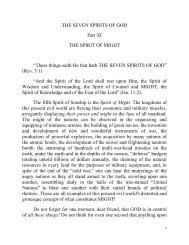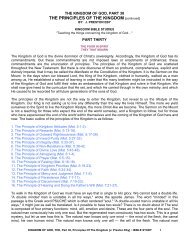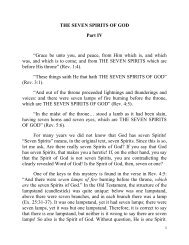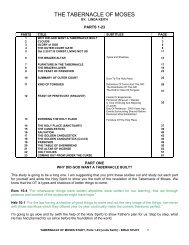Song of the Bride, Parts 1-34 - Feasting at the King's Table
Song of the Bride, Parts 1-34 - Feasting at the King's Table
Song of the Bride, Parts 1-34 - Feasting at the King's Table
Create successful ePaper yourself
Turn your PDF publications into a flip-book with our unique Google optimized e-Paper software.
mo<strong>the</strong>r’s sons were incensed against me; <strong>the</strong>y made me keeper <strong>of</strong> <strong>the</strong> vineyards; but mine own vineyard have<br />
I not kept."<br />
This is not <strong>the</strong> sinner, but <strong>the</strong> <strong>Bride</strong> who has become aware <strong>of</strong> her self-life. The Baptism <strong>of</strong> <strong>the</strong> Spirit is given,<br />
not simply for power to do miracles, but for power to bring <strong>the</strong> self-life to de<strong>at</strong>h. We are called to be witnesses<br />
unto Him, and this word is from <strong>the</strong> word "martyr." Th<strong>at</strong> is exactly wh<strong>at</strong> <strong>the</strong> Spirit wants to do—bring us to a<br />
place <strong>of</strong> dying to old ways, <strong>the</strong> old n<strong>at</strong>ure, to let <strong>the</strong> Lord arise and rule in us.<br />
The beauty, which <strong>the</strong> bride thought, she had, wi<strong>the</strong>rs up and drops <strong>of</strong>f. She sees her own blackness and<br />
unworthiness and she knows th<strong>at</strong> those who behold her must see how unfit she is, as yet, to be His <strong>Bride</strong>. God<br />
makes her to know th<strong>at</strong> she must live and walk in <strong>the</strong> Spirit and all <strong>the</strong> unworthy motives, desires, words and<br />
actions must be put away if she would be a living epistle read by all men.<br />
Conscious <strong>of</strong> her own unworthiness, she declares th<strong>at</strong> she is as black as <strong>the</strong> tents <strong>of</strong> Kedar. The dark skinned<br />
Arabs <strong>of</strong> <strong>the</strong> desert covered <strong>the</strong>ir tents with black go<strong>at</strong>skins, a figure <strong>of</strong> <strong>the</strong> blackness <strong>of</strong> sin, an expression <strong>of</strong><br />
<strong>the</strong> feeling <strong>of</strong> unworthiness <strong>of</strong> every soul who is drawing nearer to God. These black tents are a striking<br />
contrast to <strong>the</strong> princely white tent <strong>of</strong> Solomon <strong>the</strong> <strong>Bride</strong>groom. God shows her th<strong>at</strong> she will never be anything<br />
but black in herself; He calls her to die daily th<strong>at</strong> <strong>the</strong> life <strong>of</strong> Christ may be manifested in her mortal body.<br />
She remembers th<strong>at</strong> God sees her in His Son, and in Him she is white and in His worthiness she is worthy.<br />
Then she exclaims, "I am comely as <strong>the</strong> curtains <strong>of</strong> Solomon." This refers to <strong>the</strong> curtains <strong>of</strong> <strong>the</strong> Tabernacle,<br />
made <strong>of</strong> pure white linen, which speaks <strong>of</strong> Christ’s spotless humanity. Inwrought into <strong>the</strong> curtains were purple<br />
(His royalty); blue (His heavenly character); scarlet (a symbol <strong>of</strong> His suffering); and gold (His divine n<strong>at</strong>ure).<br />
These are emblems <strong>of</strong> Christ in His different aspects and <strong>at</strong>tributes. Rev. 19:8 shows th<strong>at</strong> this same spotless<br />
raiment has been given to <strong>the</strong> wife <strong>of</strong> <strong>the</strong> Lamb. Ro<strong>the</strong>rham: "And it h<strong>at</strong>h been given unto her, th<strong>at</strong> she should<br />
be arrayed in fine linen, bright, pure, for <strong>the</strong> fine linen is <strong>the</strong> righteous acts <strong>of</strong> <strong>the</strong> saints."<br />
The literal meaning <strong>of</strong> "bright and pure" is "radiant and pure." "Bright" is from a word meaning "flaming torch."<br />
The <strong>Bride</strong>’s wedding garment is not only pure and holy it is glorious, shining, and radiant. It is through faith in<br />
His work on <strong>the</strong> cross th<strong>at</strong> little by little she puts it on. Through being identified with Him she has power to put<br />
<strong>of</strong>f all th<strong>at</strong> is not <strong>of</strong> Him. She must do this day by day. When she is clo<strong>the</strong>d in Him she will appear in His<br />
likeness!<br />
The "daughters <strong>of</strong> Jerusalem" represent those who are not among <strong>the</strong> virgins, yet are not enemies; <strong>the</strong>y may<br />
be won for Solomon if <strong>the</strong>y do not see our blackness too plainly. The bride entre<strong>at</strong>s <strong>the</strong>m not to look upon her<br />
blackness, nor to see her apart from Solomon.<br />
I would share a word <strong>of</strong> caution here. It only discourages us if we see our failures and do not behold <strong>the</strong> beauty<br />
<strong>of</strong> Christ and know our sufficiency in Him. On <strong>the</strong> o<strong>the</strong>r hand, if we see only wh<strong>at</strong> we are in Him and do not<br />
discern wh<strong>at</strong> must be put <strong>of</strong>f, we may become self-s<strong>at</strong>isfied and puffed up.<br />
"The sun has scorched me." This is <strong>the</strong> darkness th<strong>at</strong> remains from <strong>the</strong> effects <strong>of</strong> exposure to <strong>the</strong> sun. The<br />
defects, (tan and wrinkles) which have been left upon our human n<strong>at</strong>ure through being controlled by sin and<br />
through tending <strong>the</strong> vineyards <strong>of</strong> <strong>the</strong> world, do not disappear as soon as we become new cre<strong>at</strong>ures in Christ<br />
Jesus. If this were so, we would be faultless <strong>at</strong> once and would have no need <strong>of</strong> going on unto perfection.<br />
(Th<strong>at</strong> would be nice!) No, it is a process. Many today are denying th<strong>at</strong>, and saying "It is all finished", but even<br />
n<strong>at</strong>ure will show you th<strong>at</strong>, after a seed germin<strong>at</strong>es, it must receive w<strong>at</strong>er, sunshine, and be "dunged about." It<br />
doesn’t autom<strong>at</strong>ically come to fullness until it goes through <strong>the</strong> process! Its growth is a picture <strong>of</strong> our spiritual<br />
life.<br />
‘My mo<strong>the</strong>r’s sons were incensed against me." The mo<strong>the</strong>r <strong>of</strong> <strong>the</strong> bride is Humanity, represented by Eve. It is<br />
<strong>the</strong> mo<strong>the</strong>r’s sons, n<strong>at</strong>ural men, who have enticed, tempted and made her keeper <strong>of</strong> <strong>the</strong> vineyards <strong>of</strong> <strong>the</strong> world.<br />
As she kept <strong>the</strong> vineyards <strong>of</strong> <strong>the</strong> world, <strong>the</strong> flesh, and <strong>the</strong> devil, <strong>the</strong> sun <strong>of</strong> <strong>the</strong> world and sin be<strong>at</strong> down upon<br />
her. She forgot <strong>the</strong> vineyard <strong>of</strong> her own soul and beauty and it was neglected, and overgrown with thorns,<br />
thistles and weeds. It remained rocky and unfertile. A believer can be so taken up with caring for her little part<br />
SONG OF THE BRIDE, <strong>Parts</strong> 1–<strong>34</strong> [Elaine Cook] ~ BIBLE STUDY 4


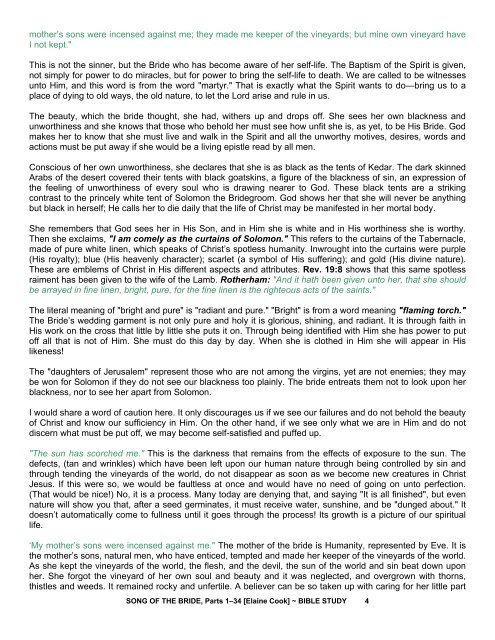
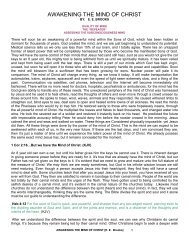
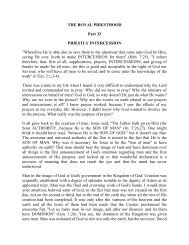
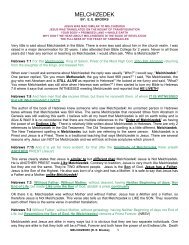
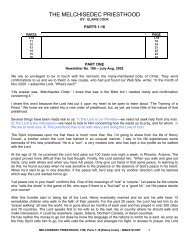
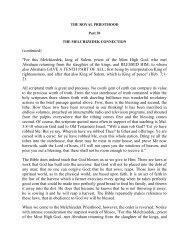
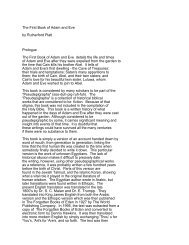
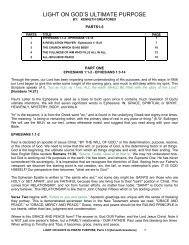
![WOOD AND STONE â THE STORY OF KING CAIN [EE Brooks]](https://img.yumpu.com/31019666/1/190x245/wood-and-stone-a-the-story-of-king-cain-ee-brooks.jpg?quality=85)
